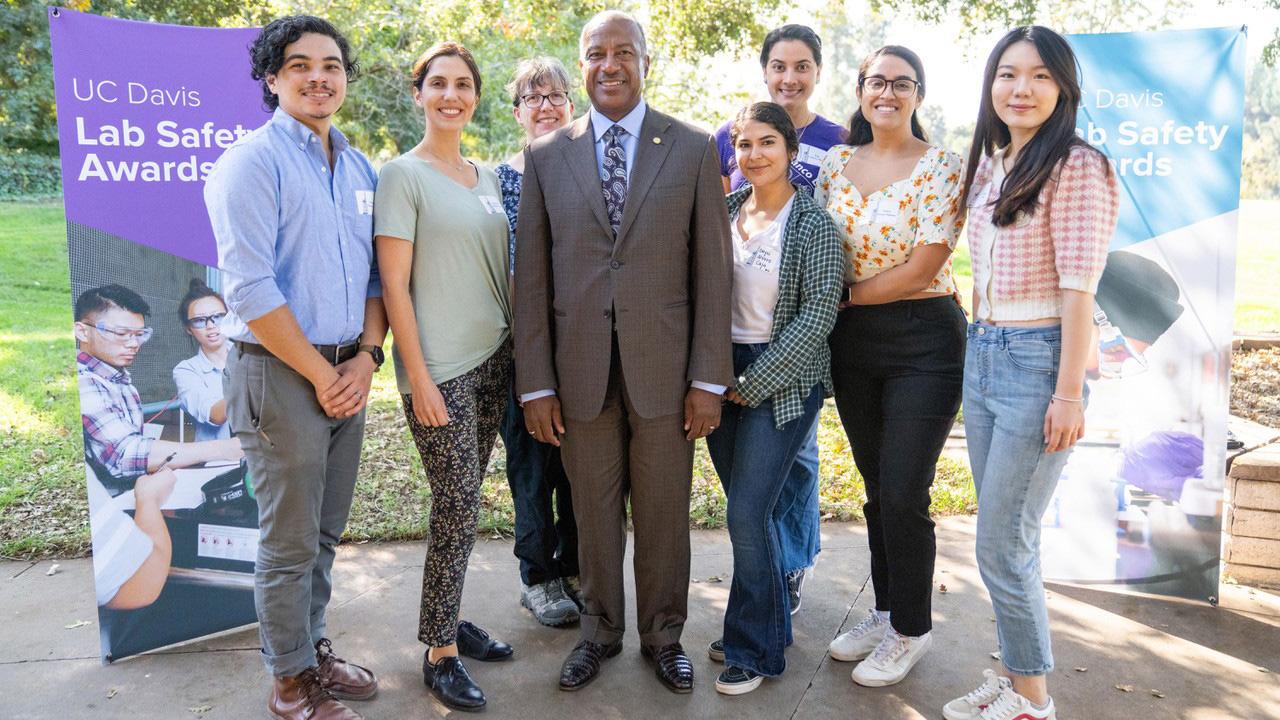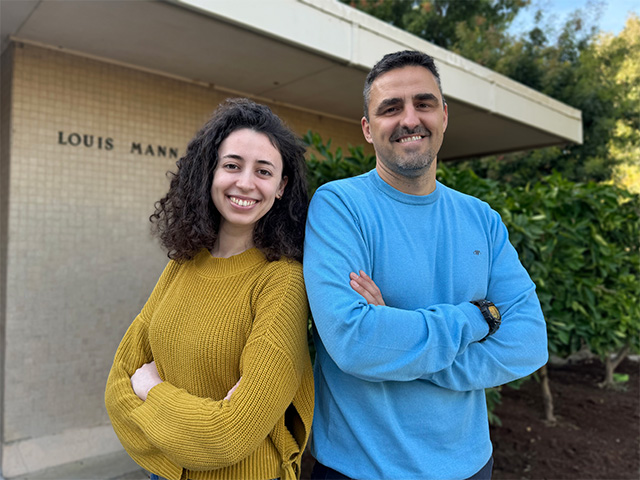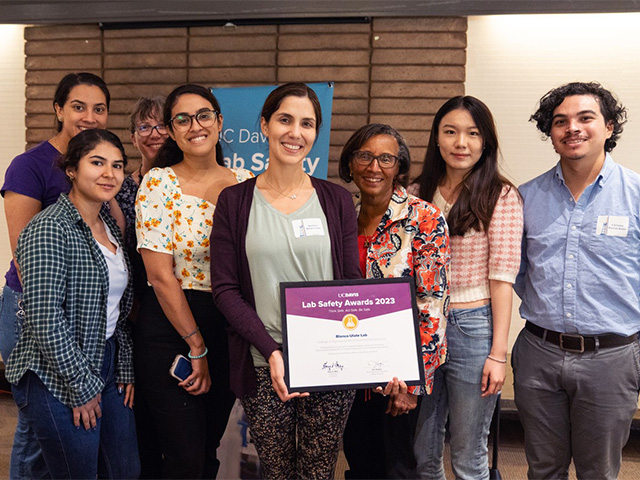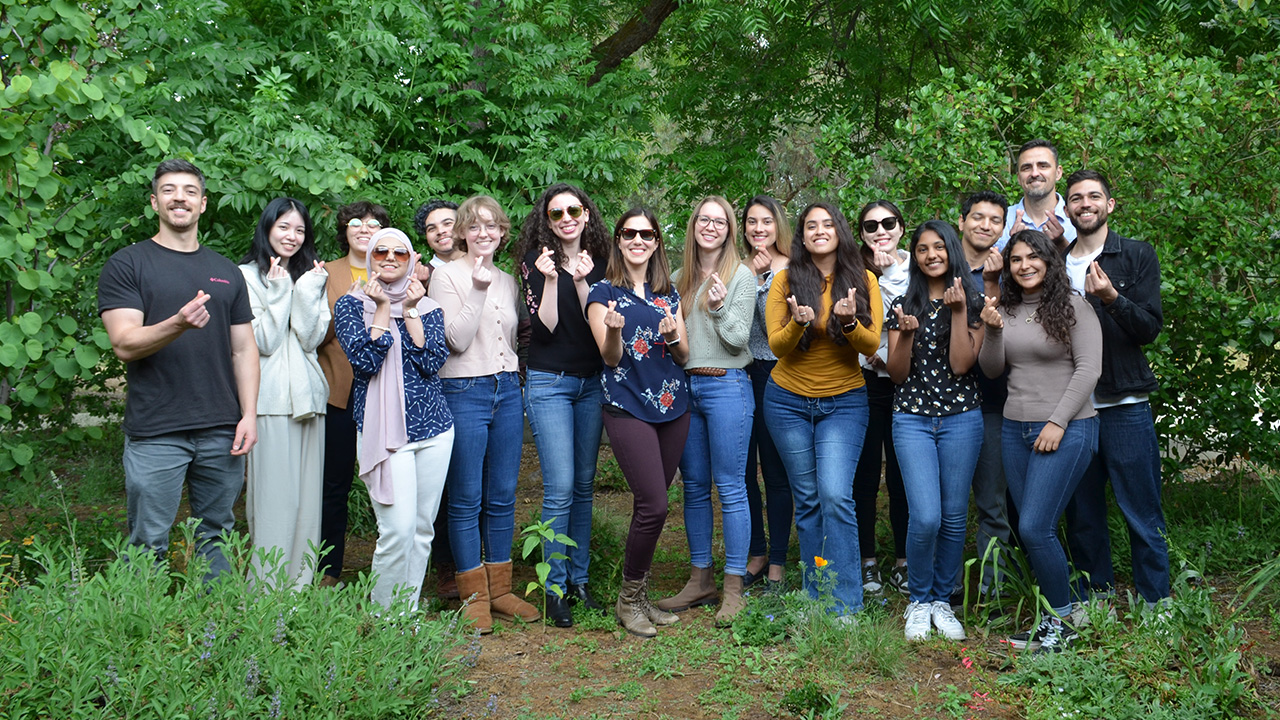
Collaborative culture in Blanco-Ulate Lab lands campus Safety Award
Sbodio, Mesquida Pesci lead multi-year effort
Learn. Improve. Ask questions. No error needs to be hidden away. Relationships are important. We’re in this together.
These are some of the guideposts for safety in the lab that Saskia Mesquida Pesci and Adrian Sbodio have been following for the last few years, and their efforts have paid off. Their work on behalf of the lab run by Barbara Blanco-Ulate, in the UC Davis Department of Plant Sciences, was recognized recently with a Lab Safety Award from the campus Safety Services office.

Mesquida Pesci is a graduate student in the lab, studying the interaction between fruit and the fungi that cause it to decay. Sbodio is a staff researcher and lab manager for the Mann Building, where the Blanco-Ulate lab and others are located. Their focus on safety is supported by a team of graduate and undergraduate students who share in the responsibilities of a lab rated as BSL-1 – or biosafety level 1.
Lab members work with organisms such as fungi that cause disease in fruits and vegetables. In addition, they handle a couple hundred chemicals, operate with potential fire hazards, work with procedures that are constantly getting updated, keep records for reporting to various state and federal government agencies as often as every two weeks, and prepare for inspections two to three times a year.
To deal with all that, and to achieve a clean record over the past several years, Mesquida Pesci and Sbodio have cultivated a culture of collaboration and trust, they said: When a lab member has a question, they’re not afraid to ask. If someone makes a mistake, they’re not afraid of being spoken to harshly. Lab members learn how to spot problems and fix them before an accident happens. And, they have a good time doing it.
“There are no silly questions,” Mesquida Pesci said.
Here’s their winning formula for building a culture that produces safety, day in and day out:
Communication
“Whenever we see something wrong, we speak up about it,” Sbodio said. “We don’t leave it. It doesn’t matter who did it.” But he makes sure the communication is supportive, collegial, one-on-one, and never harsh or humiliating. Otherwise, people would hide their mistakes ‒ and “everybody makes mistakes,” he added.
In addition, communication recognizes that many lab members speak English as a second language. Spanish, Portuguese, Italian, and Mandarin are some of the tongues also spoken in the lab. That can create confusion when reading technical documents and government regulations written in bureaucratic English, which confuses even native English speakers.

Constant learning
Sbodio attends classes every year to refresh his knowledge and stay on top of constantly changing rules. A few years ago, for example, he learned of a decrease in the distance required from the lab’s door to the eye-wash stations and emergency showers out in the hallway: So, he advocated to buy and install a new eyewash/shower station closer to the labs.
New lab members start out with online training. As rules change, procedures and documentation get updated too, and training follows for all lab members, Mesquida Pesci and Sbodio said.
“Whenever I learn something new, I tell the safety delegates,” Sbodio added, referring to the lab’s teammates in the chain of responsibility. “We’re constantly changing and adapting with the rules.”
Relationships
Relationships within the lab and with safety personnel outside the lab must be strong to transform written procedures into daily practice.
When they need back-up, the team turns to others outside the lab who have more expertise: Karin Deal, the department’s safety coordinator, and Ayla Norris, a safety inspector with the United States Department of Agriculture who works with a Agricultural Research Service lab housed in the same building. Both are responsive and helpful, so questions can be clarified quickly, the team said.
“Karin is our North Star,” Mesquida Pesci said.
Importantly, the efforts all are supported by Blanco-Ulate. “The principal investigator in the lab is the one who sets the tone,” Sbodio said.
Share responsibility
All lab members play a part in achieving overall lab safety. Sbodio oversees the safety efforts for all the labs in the building, while Mesquida Pesci is the Blanco-Ulate Lab’s delegate – the lead person responsible for safety in that lab. Students are organized into teams, each responsible for an area, and they rotate to learn about different areas of safety.
Ahead of formal inspections, Sbodio organizes self-inspections, in which lab members – mainly students – measure their own performance against the safety standards. Teams also prepare with members of other labs in the building. “That inner network helps us inspire safety,” Mesquida Pesci said.
Make it fun
One day, students called out others who were wearing lab coats in the office, a no-no under the safety regulations. It was a fun moment, Mesquida Pesci recalled, and she knew the safety messages were getting through. “We try to make safety enjoyable,” she explained.

Next: Expand the safety culture
This is Sbodio’s second Safety Award in two years. Last year, a student-led effort in the nearby Melotto Lab, also under his supervision, also won. It was the first such award for a lab in the Department of Plant Sciences.
The Mann building has become a “safety hub,” the team said, and Sbodio hopes to expand the safety culture to other labs in the department. His responsibilities recently were extended to the Postharvest Facilities Lab in Wickson Hall, and he will work to inspire lab members there and beyond, he said.
Sbodio, who is an employee of the College of Agricultural and Environmental Sciences, has wider responsibilities including tending to equipment and machinery, training people to use them, helping students using that equipment to set up their experiments, plus keeping track of chemical inventories, purchasing and shipments. He has a background in nutrition and 16 years working in postharvest research facilities on campus.
His mantra: “I know I don’t know everything, but I can find out.”
About the Blanco-Ulate Lab
Learn more here about the work of Barbara Blanco-Ulate, an associate professor working to improve the quality of crops after they are harvested.
Media Resources
- Trina Kleist, UC Davis Department of Plant Sciences, tkleist@ucdavis.edu, (530) 754-6148 or (530) 601-6846
